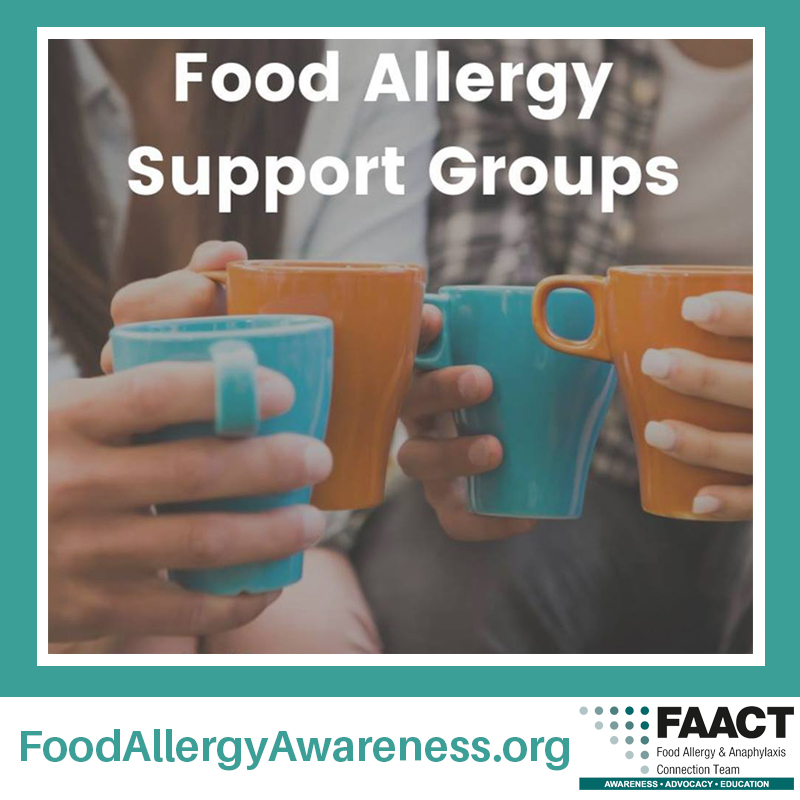Food Allergy Support Groups
Support Groups
Back to Category View
Food Allergy Support Groups
Support groups help to connect people facing similar challenges and provide an outlet for support on many levels.
Sometimes it’s helpful to turn to others outside your immediate circle of friends and family for advice and comfort. Through a support group, you can share your experiences and advice and provide insight to others on how to cope with similar issues. Support groups can offer emotional support, further education and understanding, provide a place for people to share their concerns, and can help to reduce anxiety and confusion you might be facing (either alone or with your family).
A support group may include one or more of the following programs and activities: community outreach and education, resources, advocacy, training, special events, and much more. Support groups often bring in speakers and professionals from the local community who can provide valuable resources via lectures, webinars, newsletters, online postings, and community forums.
Food allergy and anaphylaxis support groups have dramatically increased in recent years. Often times, food allergy support group settings are confidential and offered at little or no cost to members. Online food allergy support groups have also become popular, appealing to individuals and families with busy schedules and those seeking specific information in a timely manner.
All of these benefits make support groups a valuable resource to communities across the world!
FAACT supports initiatives taking place across the nation and would like to recognize all those individuals who work tirelessly to create a safe environment in their communities and schools for food-allergic individuals. Until there is a cure, we need to continue to educate, advocate, and raise awareness. FAACT thanks you for your tireless efforts, amazing accomplishments, and positive contributions to communities across the nation!
How To Choose the Right Group
Because food allergy support groups can vary in focus, quality, and structure, you may find your local support group is not be the best fit for you. Or you may find that your local group does not discuss topics of interest to you, or perhaps the group has become inactive.
When searching for a local, regional, or national support group, thoroughly investigate all aspects of what the group provides and how the group will better your particular situation and meet your needs.
Questions to ask before joining a food allergy support group may include:
- Can I be assured my information will remain private and confidential?
- Is the location of the group’s activities and programs convenient to me, and how often does the group meet?
- Is there an administrator or moderator for the group, and what type of experience and knowledge does this individual have?
- Is the information provided through the group reliable, and from where is the information gathered?
- Is there a board-certified allergist supporting the group, how active is the medical advisory board (if there is one), and in what capacity do the group’s medical advisors serve?
- Is the group recognized by or affiliated with an educational facility or other state or national organization?
- Does the group provide specific support and resources that meet my specific needs and/or condition?
- If fees apply, how are the fees used? What are the fees in comparison with other groups or organizations?
Ask your doctor for his or her professional opinion on what the group provides and whether he/she approves of the group.
If the group’s background proves credible, consider attending one or two meetings to see if the group would be a good fit. Just by attending and listening, you may discover other people – or perhaps even just one person – who are experiencing the same issues as you. Great friendships are formed in support groups! These relationships can last a lifetime and become an invaluable support system.
Don’t ever feel obligated to continue attending meetings or participating in group discussions if the group no longer fits your needs. Circumstances often change as people go through different stages of coping. You may also want to consider leaving a group if you find that the members are pessimistic or judgmental; pressure products, services, or treatment; gives medical advice without the proper credentials; or are negative in any way.
For more information on Support Group Development, please contact Lisa Rutter, Director of Support Group Development.